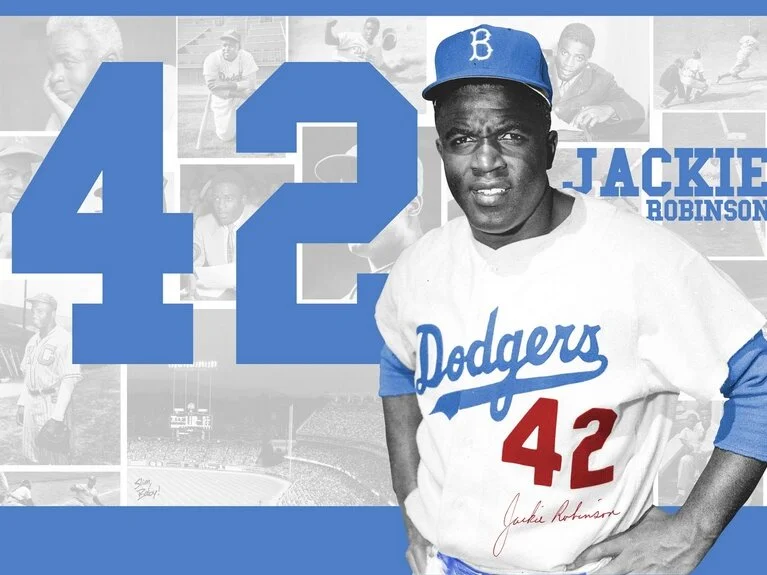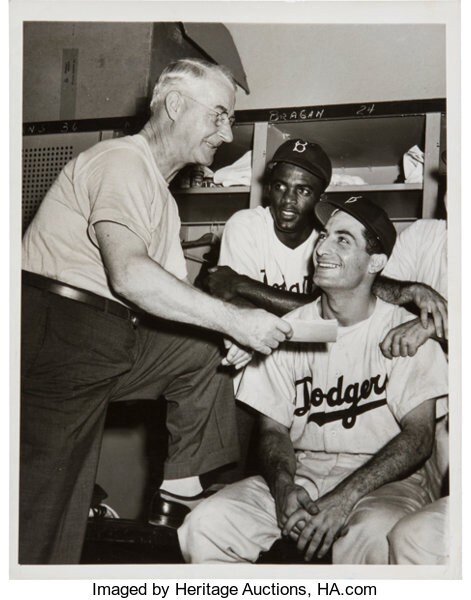The 1947 season was just days from starting when MLB commissioner Happy Chandler was contemplating how to deal with the controversial manager of the Dodgers, Leo Durocher. Durocher's lifestyle and ties to know gamblers and mobsters concerned Chandler.
On April 9, 1947, before Brooklyn announced Robinson as joining the big-league roster Happy Chandler announced a one-year suspension of Durocher. Chandler cited Durocher's string of moral shortcomings: gambling debts, associations with known gamblers and nightlife figures, and a scandalous marriage with charges of adultery, bigamy, and contempt of court.
Everyone outside of Brooklyn rejoiced at the Dodgers and Durocher's misery. Gone was a crucial part of Jackie Robinson's safety net of a manager who accepted and lay the law down about his role on the team. Who knows what effect Durocher would have had on Robinson if he would have been allowed to manage the season. Durocher would have been fierce in defending Robinson against the opposition. Every beanball, unnecessarily hard slide, or actual spiking, would have propelled Durocher onto the field, demanding the umpires throw the perpetrator out of the game. Based on his previous history, we can be confident he would have ordered retaliatory measures by Brooklyn pitchers and baserunners. However, we will never know.
Robinson’s 1947 Rookie Card.
Finding themselves without a manager, Branch Rickey now had to act quickly. His safety net of Durocher and his handling of the situation throughout spring training was now gone. Who would be able to handle the stress of what the position would bring?
The press figured the ideal man would be someone on Durocher's staff who had been with the Dodgers during spring training and prepared to deal with what Robinson would be facing. Durocher's brain trust only comprised of three men, Ray Blades, Clay Hopper, and Jake Pitler. All three men were under contract. Blades was Durocher's assistant manager, hired by Rickey before the 1946 season, replacing Charlie Dressen, who was lured away by Larry MacPhail to the Yankees. The New York Post ran the headline that Blades would replace Durocher as manager.
Clay Hopper was Robinson's manager in the previous season in Montreal. Under his leadership, Robinson thrived, and he came to appreciate Robinson's work ethic and tenacity. Jake Pitler was one of Robinson's staunchest supporters during spring training.
While others speculated managerial duties staying within the organization, Rickey chose former Yankees manager Joe McCarthy, winner of seven World Series titles, who retired after the 1946 season. McCarthy turned Rickey down. His next choice, Clyde Sukeforth, brought Robinson from Chicago to Brooklyn to convince Robinson to sign with the Dodgers in August of 1945. Sukeforth agreed to manage the team until Rickey found a successor. He batted Robinson sixth playing first base for his historic debut on April 15, 1947.
Robinson with manager Burt Shotton.
Despite his initiation into baseball history, Sukeforth did not stay on as the manager. Once again, Branch Rickey ventured beyond the Dodgers organization. His choice had not managed since 1933 with the Phillies. His name was Burt Shotton. Retired and living in Florida at age 62, Rickey summoned Shotton to Brooklyn and pleaded with him to take over the team for the 1947 season.
Shotton’s laid back personality could not be any more different than the fiery Durocher.. Rather than running on the field whenever Robinson found himself the victim of countless accounts of abuse, Shotton chose to let the situation resolve itself. Under Shotton, the Dodgers won the National League pennant in 1947.
Facing incredible scrutiny and disgusting racism from everywhere, Robinson endured. After getting off to a rough start, he finished the season with a .297 batting average and led the team in hits (175), runs (125), tied for the team lead in HR (12) and doubles (31) while also leading the National League in stolen bases (29). He won the first-ever Rookie of the Year Award on September 17, eleven days before the regular season ended. The award now has his name on it.
The Dodgers faced the New York Yankees in the World Series. After losing the first two games of the World Series at Yankee Stadium, the Dodgers won Game 3 and were down to their last out in Game 4, staring at a possible 3–1 series deficit. On the mound for the Yankees was Bill Bevens. In his fourth season with the Yankees, Bevens was inconsistent, evidenced by his up and down season in 1947. However, this day at Ebbets Field, he was unhittable. Although he walked ten batters, Bevens was away from throwing the first no-hitter in postseason history.
Robinson with the 1947 Rookie of the Year Award.



